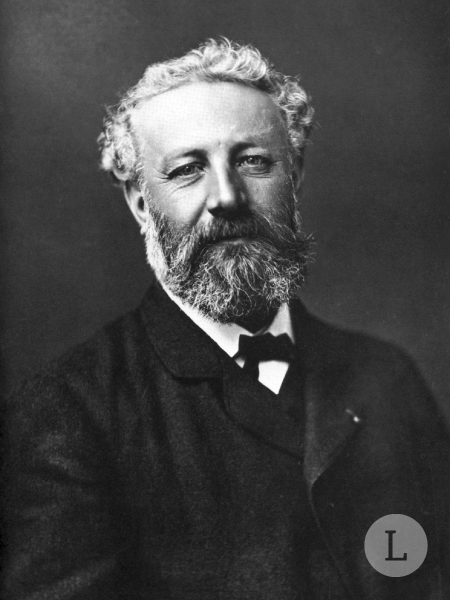
born: FEBRUARY 8, 1828
died: MARCH 24, 1905
nationality: FRENCH
movement: ROMANTICISM, NEO-ROMANTICISM
Jules Verne, born on February 8, 1828, in Nantes, France, was a prolific writer whose imaginative tales of adventure, exploration, and scientific innovation have captivated readers for over a century. Often referred to as the “Father of Science Fiction,” Verne’s body of work has left a lasting impression on the world of literature, inspiring countless authors and filmmakers to follow in his footsteps. In this in-depth biography, we’ll delve into the life of Jules Verne, discuss his most popular works, and explore his enduring influence on the world of science fiction and beyond.
EARLY LIFE AND EDUCATION
Jules Gabriel Verne was the eldest of five children born to Pierre Verne, a successful attorney, and Sophie Allote de la Fuÿe, a descendant of a prominent Nantes family. From a young age, Verne displayed a keen interest in travel and exploration, often accompanying his father on trips along the Loire River.
Verne attended the Lycée Royal in Nantes, where he excelled in literature, history, and languages. In 1847, he moved to Paris to study law, following in his father’s footsteps. However, his passion for writing eventually took precedence, and he began to pursue a career as a playwright and author.
LITERARY CAREER AND SUCCESS
Jules Verne’s writing career began with plays and short stories, but it wasn’t until he met publisher Pierre-Jules Hetzel in 1862 that his career really took off. Hetzel saw potential in Verne’s imaginative writing and encouraged him to create longer, serialized works. This collaboration resulted in the creation of Verne’s famous “Extraordinary Voyages” series, which consists of 54 novels.
TOP 10 BOOKS BY JULES VERNE
Twenty Thousand Leagues Under the Sea (1870)
This iconic novel tells the story of Captain Nemo and his incredible submarine, the Nautilus, as they embark on a thrilling underwater adventure. The novel explores themes of science, exploration, and human ingenuity.
Journey to the Center of the Earth (1864)
A fascinating tale of a group of explorers who journey deep into the Earth’s interior, encountering prehistoric creatures and other wonders along the way.
Around the World in Eighty Days (1873)
This classic adventure story follows the intrepid Phileas Fogg as he attempts to circumnavigate the globe in 80 days to win a bet. The novel explores themes of cultural diversity and the rapid advancements of the 19th-century world.
From the Earth to the Moon (1865)
In this groundbreaking work, Verne envisions a group of American inventors constructing a space cannon to launch three men to the moon. The novel examines the potential of space travel and its implications for humanity.
The Mysterious Island (1874)
A group of Civil War escapees find themselves stranded on an uncharted island, where they must use their ingenuity to survive. The novel combines elements of adventure, mystery, and scientific discovery.
Five Weeks in a Balloon (1863)
Verne’s debut novel tells the story of a daring balloon expedition across Africa, exploring the then largely unknown continent and its unique cultures and landscapes.
Michael Strogoff (1876)
This novel departs from Verne’s usual science fiction themes, focusing on a Russian courier’s perilous journey to deliver a critical message during a rebellion. The book explores themes of loyalty, bravery, and national pride.
The Adventures of Captain Hatteras (1866)
In this gripping adventure, Captain Hatteras and his crew venture to the North Pole, enduring treacherous conditions and making groundbreaking discoveries. The novel highlights the spirit of exploration and human determination.
Robur the Conqueror (1886)
The eponymous character, Robur, invents a powerful flying machine, sparking controversy and conflict among nations. This work explores the potential consequences of advanced technology and the delicate balance of power.
Master of the World (1904)
In this sequel to Robur the Conqueror, the mysterious inventor returns with an even more advanced flying machine, threatening global stability. The novel delves into themes of power, control, and the potential dangers of unchecked technological advancement.
INTERESTING FACTS
- Verne was fascinated by the idea of traveling, but he himself did not travel extensively. His vivid descriptions of foreign lands were primarily based on extensive research.
- Verne’s interest in science and technology was not limited to his writing. He was an early adopter of cutting-edge inventions, such as the telephone and the phonograph.
- Despite being known as the Father of Science Fiction, Verne insisted his works were not fictional, but rather, imaginative extrapolations of existing scientific knowledge.
- Verne ran for political office in Amiens, France, in 1888, serving as a city councilor for 15 years. He focused on education and infrastructure during his tenure.
- Verne was shot by his nephew, Gaston, in 1886, an incident that left him with a permanent limp. The motive behind the shooting remains unclear.
DEATH AND LEGACY
Jules Verne passed away on March 24, 1905, at the age of 77, in Amiens, France. His extraordinary body of work has left an indelible mark on the world of literature and popular culture. Verne’s pioneering vision and vivid imagination laid the foundation for modern science fiction, inspiring future generations of authors, such as H.G. Wells and Isaac Asimov, as well as countless filmmakers.
Verne’s novels have been translated into more than 150 languages, making him one of the most translated authors in history. His stories continue to captivate readers worldwide, and his influence on the science fiction genre is unparalleled. As we look to the future, Jules Verne’s legacy endures as a testament to the limitless potential of human imagination and the enduring power of storytelling.
